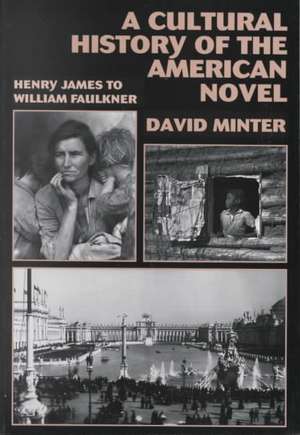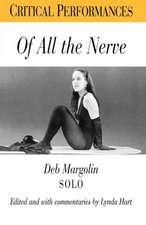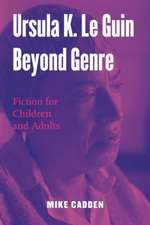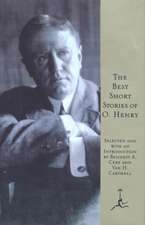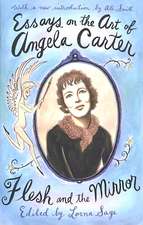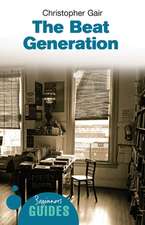A Cultural History of the American Novel, 1890–1940: Henry James to William Faulkner
Autor David L. Minteren Limba Engleză Paperback – 12 iun 1996
| Toate formatele și edițiile | Preț | Express |
|---|---|---|
| Paperback (1) | 445.46 lei 6-8 săpt. | |
| Cambridge University Press – 12 iun 1996 | 445.46 lei 6-8 săpt. | |
| Hardback (1) | 706.15 lei 6-8 săpt. | |
| Cambridge University Press – 28 apr 1994 | 706.15 lei 6-8 săpt. |
Preț: 445.46 lei
Preț vechi: 500.52 lei
-11% Nou
Puncte Express: 668
Preț estimativ în valută:
85.24€ • 89.18$ • 70.81£
85.24€ • 89.18$ • 70.81£
Carte tipărită la comandă
Livrare economică 02-16 aprilie
Preluare comenzi: 021 569.72.76
Specificații
ISBN-13: 9780521467490
ISBN-10: 0521467497
Pagini: 296
Dimensiuni: 155 x 230 x 19 mm
Greutate: 0.44 kg
Ediția:Revised
Editura: Cambridge University Press
Colecția Cambridge University Press
Locul publicării:New York, United States
ISBN-10: 0521467497
Pagini: 296
Dimensiuni: 155 x 230 x 19 mm
Greutate: 0.44 kg
Ediția:Revised
Editura: Cambridge University Press
Colecția Cambridge University Press
Locul publicării:New York, United States
Cuprins
A preface in two parts; Acknowledgements; A note on sources, citations and bibliography; Part I. A Dream City, Lyric Years and a Great War: 1. The novel as ironic reflection; 2. Confidence and uncertainty in The Portrait of a Lady; 3. Lines of expansion; 4. Four contemporaries and the closing of the West; 5. Chicago's 'dream city'; 6. Frederick Jackson Turner in the dream city; 7. Henry Adam's Education and the grammar of progress; 8. Jack London's career and popular discourse; 9. Innocence and revolt in the 'lyric years': 1900–1916; 10. The Armory show of 1913 and the decline of innocence; 11. The play of hope and despair; 12. The Great War and the fate of writing; Part II. Fiction in a Time of Plenty: 13. When the war was over: the return of detachment; 14. The 'jazz age' and the 'lost generation' revisited; 15. The perils of plenty, or how the twenties acquired a paranoid tilt; 16. Disenchantment, flight and the rise of professionalism in an age of plenty; 17. Class, power and violence in a new age; 18. The fear of feminisation and the logic of modest ambition; 19. Marginality and authority/race, gender and region; 20. War as metaphor: the example of Ernest Hemingway; Part III. The Fate of Writing during the Great Depression: 21. The discovery of poverty and the return of commitment; 22. The search for 'culture' as a form of commitment; 23. Three responses: the examples of Henry Miller, Djuna Barnes and John Dos Passos; 24. Cowboys, detectives and other tough-guy antinomians: residual individualism and hedged commitments; 25. The search for shared purpose: struggles on the Left; 26. Documentary literature and the disarming of dissent; 27. The Southern Renaissance: forms of reaction and innovation; 28. History and novels/novels and history: the example of William Faulkner; Notes; Bibliographical notes; Bibliography; Index.
Recenzii
"It [the book] gives contemporary scholars and students a desperately needed sense of place and position from which to view and understand the origins of our dominant literary and intellectual tradition. ...Minter balances a broad and thorough range of works and authors with in-depth, detailed, and persuasive readings of individual texts. ...Minter brings fresh insights to his historical and literary materials through acute critical intelligence, informed historical consciousness, and penchant for developing fascinating juxtapositions and relations." Modernity
"David Minter's book is a model of the way literary history should be done...Minter's elegant writing makes the book a pleasure to read." John T. Irwin, Johns Hopkins University
"...A Cultural History of the American Novel approximates a luminous archaeology of the burgeoning modernist period, uncovering the spectral relations between culture, cultural production, and the socio-political pressures of the times....Given the wide range of such powerful insights and 'cultural readings,' Minter's book will undoubtedly prove valuable not only to scholars of American literary history but also to anyone interested in understanding the all too often invisible connections between cultural production, 'real' people and 'real issues'--such as racism, scientific/technological invention, discovery, ethnicity, borders, responsibility, freedom, World War. hope, assent and democracy." Carlton Smith, American Literature
"David Minter's book is a model of the way literary history should be done...Minter's elegant writing makes the book a pleasure to read." John T. Irwin, Johns Hopkins University
"...A Cultural History of the American Novel approximates a luminous archaeology of the burgeoning modernist period, uncovering the spectral relations between culture, cultural production, and the socio-political pressures of the times....Given the wide range of such powerful insights and 'cultural readings,' Minter's book will undoubtedly prove valuable not only to scholars of American literary history but also to anyone interested in understanding the all too often invisible connections between cultural production, 'real' people and 'real issues'--such as racism, scientific/technological invention, discovery, ethnicity, borders, responsibility, freedom, World War. hope, assent and democracy." Carlton Smith, American Literature
Descriere
This account of America reconstructs literary history as a cultural drama out of which novels and the events emerge as kindred forms of cultural expression.
